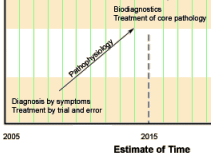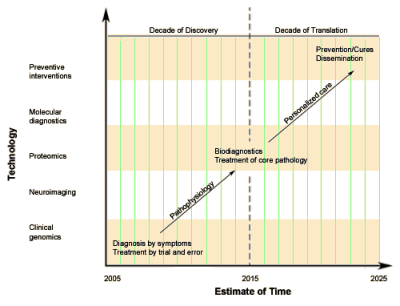 Tom Insel came to the NIMH at the height of the rise of neuroscience. It was a new century. The future DSM-5 team was just setting its sights on finally adding the hard science fixings to the psychiatrized brain. The drugs were steadily pouring from the pharmaceutical pipeline and were hitting the top of the charts in sales. New drug strategies were closing in on the treatment resistant cases. With the human genome cracked and a maturing of neuroimaging, it was just a matter of time before the dream of the new psychiatry would be a reality. A few years into his reign, Dr. Insel announced this new paradigm, Psychiatry was to become Clinical Neuroscience:
Tom Insel came to the NIMH at the height of the rise of neuroscience. It was a new century. The future DSM-5 team was just setting its sights on finally adding the hard science fixings to the psychiatrized brain. The drugs were steadily pouring from the pharmaceutical pipeline and were hitting the top of the charts in sales. New drug strategies were closing in on the treatment resistant cases. With the human genome cracked and a maturing of neuroimaging, it was just a matter of time before the dream of the new psychiatry would be a reality. A few years into his reign, Dr. Insel announced this new paradigm, Psychiatry was to become Clinical Neuroscience:NIMH Director’s Blogby Thomas InselJanuary 26, 2012NIMH, like all Institutes at NIH, has an advisory council that meets three times each year. The National Advisory Mental Health Council [NAMHC] is a distinguished group of scientists, advocates, clinicians, and policy experts. Each of our meetings includes a closed session to review individual grants considered for funding and a session open to the public that engages this diverse group in discussions about the larger issues that guide NIMH funding.
At last week’s session, we heard a recurrent tension around one such larger issue. Some members of Council bear witness to the poor quality of care, the unmet medical need, and the diminishing investments by states on behalf of people with mental disorders. They reasonably ask, “How are we ensuring that the science that NIMH has produced is implemented where the need is greatest?” They also question on the pay-off of genetics research. After all, two decades after the gene for Huntington’s disease was identified, we still have no effective treatments, and Huntington’s disease is genetically far simpler than schizophrenia or bipolar disorder. In contrast to so many neurological diseases, we have effective treatments for schizophrenia and bipolar disorder. NIMH should be investing to ensure these are available.
The opposing argument runs something like this. There has been no major innovation in therapeutics for most mental disorders since 1960. Current treatments are not good enough for too many. Rather than investing scarce dollars for incremental improvements or increased dissemination of mediocre interventions, we need invest in the fundamental science of brain and behavior so that we can understand how to develop better treatments.
While I may have oversimplified the two sides of this debate, the divide is substantial. Some advisors want more funds in services research; other advisors want more funds in basic neuroscience. Some are thinking of the immediate needs; others are focused on the paradigm shifts that may be revealed by another decade of research. And with the NIMH budget stretched, tough choices must be made…
Sixty years ago, the nation faced a similar short-term vs. long-term debate about polio. The needs were growing and the causes were unknown. Some wanted funds invested only in better services, including improved iron lungs. Others argued for investing in a vaccine with a long-term goal of eradication. As David Oshinsky explains in his outstanding retelling of this debate, the government went with the services approach, leaving advocates and families to raise funds for vaccine development. Let us hope we don’t short-change our grandchildren, sixty years from today, by failing to invest in the long-term promise of more effective diagnostics and therapeutics for mental disorders.
The American ConversationThe TakawayOctober 07, 2015[audio]Millions of Americans suffer from mental illness. The vast majority of them have never been violent and never will be. But over the last few years, a good number of the young men involved in mass murders have suffered from mental illness: Christopher Harper-Mercer, the gunman who killed nine people at Umpqua Community College last week, had Autism Spectrum Disorder.
James Holmes, recently sentenced to life in prison for murdering 12 people in Aurora, Colorado, was diagnosed with a disease similar to schizophrenia. Adam Lanza, who shot and killed 26 people at Sandy Hook Elementary School, had severe anxiety, obsessive-compulsive disorder, anorexia and a number of other problems.
As the director of the National Institutes of Mental Health [NIMH], Dr. Thomas Insel has kept track of these headlines. As he steps down from his position after 13 years at the NIMH, Dr. Insel reflects on the recent, great advances in brain science, and his disappointment that these developments have yet to reach a great majority of those who suffer from mental illness.
"The mental health system is badly broken," Dr. Insel tells The Takeaway. "The problem right now is that we have a lot of people with mental illness that are not treated at all, treated very late, or treated very inadequately."
In November, Dr. Insel will step down after 13 years leading NIMH for a job at Google Life Sciences. He tells John Hockenberry about his hopes for his new position, and technology’s potential in treating mental illness…
 Dr. Insel went straight from his psychiatry residency [1976-1979] to the NIMH [1979-1994], then to the Yerkes Primate Center [1994-1999], followed by administrating a translational behavioral neuroscience program [1999-2002], then he finally returned to the NIMH as Director [2002-2015]. I happen to know this history [which is devoid of any clinical experience] because I was trying to understand how he had come to have such a simplistic view of mental illness. He apparently believes those population estimates he often quotes are accurate ["… by 20xx, depression will be the number x cause of xxxxx"] [epidemic?]. He seems to have accepted the notion that all mental illnesses are biomedical circuit problems and the solution to the mental health system is badly broken is a new crop of drugs/treatments and some kind of outreach to find the untreated cases. Having failed to achieve the 2015 goal of "Biodiagnostics" and "Treatment of Core Pathology", he just went ahead and declared a new Biodiagnostic System anyway – the RDoC [whatever that is].
Dr. Insel went straight from his psychiatry residency [1976-1979] to the NIMH [1979-1994], then to the Yerkes Primate Center [1994-1999], followed by administrating a translational behavioral neuroscience program [1999-2002], then he finally returned to the NIMH as Director [2002-2015]. I happen to know this history [which is devoid of any clinical experience] because I was trying to understand how he had come to have such a simplistic view of mental illness. He apparently believes those population estimates he often quotes are accurate ["… by 20xx, depression will be the number x cause of xxxxx"] [epidemic?]. He seems to have accepted the notion that all mental illnesses are biomedical circuit problems and the solution to the mental health system is badly broken is a new crop of drugs/treatments and some kind of outreach to find the untreated cases. Having failed to achieve the 2015 goal of "Biodiagnostics" and "Treatment of Core Pathology", he just went ahead and declared a new Biodiagnostic System anyway – the RDoC [whatever that is]. Tom Insel was a surprise pick as Director of the NIMH in 2002. He came in like a lion championing the cause of Clinical Neuroscience. My guess is that he, the powers that be in the APA, and the DSM-5 Task Force thought that their bet that scientific advances in genetics and the identification of biomarkers was a slam dunk – and would come in time to complete the biomedical paradigm shift begun in the 1980s. They were dead wrong about that, but unable to alter their trajectory. Dr. Insel has been silent about the set-backs: record fines against the makers of the psychiatric-drugs, the scandals involving psychiatrists in high places, the embarrassment of the DSM-5 and its COI problems, the disappointment in the progress in psychiatric research, ghostwriting and guest authorship, and a growing sentiment that instead of new drug development we should be focusing on the over-use and misuse of the drugs we already have. The refrain,  "Dr. Insel reflects on the recent, great advances in brain science…" has been oft-repeated, but I can’t come up with anything that might justify that assertion. Let’s hope that his replacement will be someone who is able to find a reset button that might get us on a new path [and acknowledge the sins of the fathers].
"Dr. Insel reflects on the recent, great advances in brain science…" has been oft-repeated, but I can’t come up with anything that might justify that assertion. Let’s hope that his replacement will be someone who is able to find a reset button that might get us on a new path [and acknowledge the sins of the fathers].

Too bad, we’ll never find out what the RDoC is. Insel will be drawing those inscrutable diagrams at Google and everyone will nod at them as though they mean something.
In its first almost 40 years, NIMH enjoyed the leadership of five directors who were astute politicians and administrators. They saw their job as running interference for the scientists for funding, for Congressional support, and for public image. None of the first five Directors had reputations as scientists. They let the field shape the science through a bottom-up process. Over the last almost 20 years, the two most recent Directors acted very differently, operating with a top-down style of management that frequently was abrasive. The mindset within NIMH shifted away from long term investments and planning. As one result, senior Career Scientist awards were phased out to allow more funds for grant proposals from young investigators. This was no sociological accident. It paralleled the change we saw in the corporate world to preoccupation with quarterly performance over longer term growth and investment. A dismal result of that change was that many academic departments lost the benefit of suddenly uncompensated research mentors who could pass along the institutional memory of our research tradition to a new generation. That may be one reason why so much current clinical research is so frightfully bad. The latest manifestation of that decline is RDoC – Dr. Insel’s parting legacy. A second result of the change to top-down management was the proliferation of scientifically weak mega-studies like STAR*D and others that Dr. Mickey writes about so often. These siphoned off whatever funds may have been gained from ending the senior Career Scientist awards, so the success rate of new grant applications still is disappointing. So we ended up with a lose-lose for the academic centers on which NIMH relies.
Do we need a reset button? You bet.
Bernard ,
I have a ton of questions after reading your op ed (link to your writing about RDoC), but realize this is probably is not the appropriate forum for a Q&A–
I am naturally curious when anyone talks about the best way forward for psychiatry. No matter how egregiously unethical, unscientific or unbelievable the exposed corruption of psychiatry’s well documented pathway to Market Based Medicine, truly is , all that really merits research and discussion is what the practice of psychiatry has morphed into and how extensive, how severe the damages are. Is this not a reasonable expectation given the past 30 years have all but discounted everything but the market value of a patient?
” The existence of a disease is not predicated on having a biological test for it, and for many diseases there is no conclusive test. ”
No argument against your reasoning, but this statement of yours causing me to have *flashbacks* to as recently as 5 years ago when I was an accessory to the assumptions made by the founding fathers of biomedical psychiatry; that not only can diseases and disorders be established by consensus, but drugs can be called first line treatment for the biological cause we only pretty much feel absolutely certain is the cause for the *symptoms* we have relabeled, a disease…
This still feels very bad to me– doesn’t help knowing how many psychiatric clinicians accepted the voice of *medical authority*/psychiatrists either. And I would be way more interested in the details of the derailment of academic research IF I weren’t preoccupied with fact that absolutely nothing has even impeded the rate at which children are still fulfilling Joseph Biederman’s promises to J&J, Eli Lily–and whomever benefits directly from the profits he has personally sought. (just one example)
Is there any reason to expect that a change in the leadership of NIH the APA– AACAP will impact the currently marketed *practice of psychiatry*–? Are there even any psychiatrists not close to retiring who have working knowledge and vivid memory of pre DSM III psychiatry?
Even IF a dramatic shift to patient centered research criteria & almost impossible to imagine harm reduction practice of prescribing psych drugs were to actually happen– WHO, pray tell, amongst the ranks of psychiatrists today, could translate this into their clinical practice, especially at the ebb of their debunked professional claims to *scientific breakthroughs in the area of brain -chemistry”.
Your very well articulated argument for what research should and could be, only further highlights the degree to which psychiatry has transgressed—
Katie,
You are unlikely to find anyone here arguing with the points you make. But if you’ve come to this site to make that point repeatedly, the transgressions of psychiatry, and you need a target, this isn’t a very good place for you to be. The people you’re mad at don’t live here, nor do the commenters who come here have any more influence with those people [the ones your mad at] than you or I are exerting already. Not many, even like-minded psychiatrists and others, comment here because they get sniped by people who are looking to vent, even if they actually share your dismay with the problems of the last ever-so-many years.
Your well articulated comments are welcomed and interesting. But I’d appreciate if you wouldn’t see this comment section as a billboard. You’re sort of preaching to the choir, a choir who has felt as helpless as you apparently feel. Not all psychiatrists who are reasonable-thinking are old men like me. Whether it’s effective or not, maintaining this blog is the only way I have to communicate with the, "psychiatrists not close to retiring" by having a "working knowledge and vivid memory of pre DSM III psychiatry." But if you think we’re wasting our time by trying to root out and point out what’s been awry in psychiatry for the last twenty or thirty years, if you think it’s a lost cause, no one will try to change you mind here.
I was forced to add this to the comment box: "I realize that the issues tackled on this blog often evoke strong feelings – mine included. But this is not the place for contentious interpersonal dialog. Your opinions are welcomed, but categorical or ad hominem comments to or about each other are not. Persistent proselytizing or dominating the space with personal agenda is likewise unwelcome. Comments are
sometimesmoderated before publication…" Please read it carefully…When I first started writing this blog, I thought the corrupting forces [industry and cooperating physicians] were a problem in psychiatry alone, but over time have recognized that those forces are also operative throughout medicine and health care in general, more insidious. I now think that clarifying how those forces have operated in psychiatry is a lesson for all of medicine. I’m not grandiose enough to feel like one little blog at the edge of the galaxy can change something that big, but silence is certainly not an acceptable alternative.
So here’s my point, when you say:
That’s not a question. It’s a statement. "Nothing will make up for the degree to which psychiatry has transgressed." Point made and registered. But I’d appreciate it if you feel unheard and have to say it over and over, your saying it some place where it might do some good. Doing that here will not be effective. It will simply chase off the people I actually want to hear from. You can say whatever you want to say to me directly at 1boringoldman@gmail.com